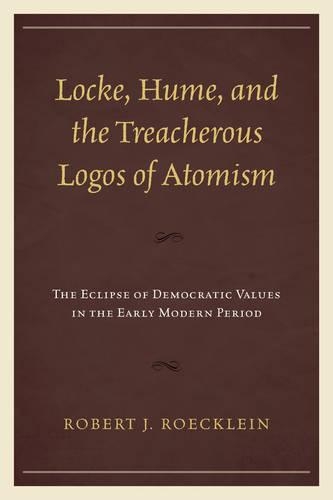
Locke, Hume, and the Treacherous Logos of Atomism: The Eclipse of Democratic Values in the Early Modern Period
(Hardback)
Publishing Details
Locke, Hume, and the Treacherous Logos of Atomism: The Eclipse of Democratic Values in the Early Modern Period
By (Author) Dr. Robert J. Roecklein
Bloomsbury Publishing PLC
Lexington Books
8th October 2015
United States
Classifications
Tertiary Education
Non Fiction
146.5
Physical Properties
Hardback
270
Width 159mm, Height 235mm, Spine 25mm
544g
Description
Modern Philosophy, Philosophy of Physics, Philosophy of language, Neurobiology, Philosophy of Perception, Modern Political Philosophyall share a common philosophical foundation: atomism. The theory of atomism that is developed in the writing of Einstein, Bohr, Schrodinger, and Reichenbach shares the same metaphysical roots as the atomism of Gottlob Frege, Ludwig Wittgenstein, and Bertrand Russell. These atomisms share the same foundation as the one developed by John Locke and David Hume. Until now, the full philosophic history, and metaphysical foundations of this theory of atomism have not been presented. Atomist theory not only contains cultural premises of great significance for the fate of public opinion, but it is also an eminently political doctrine, incompatible with the most modest degree of democracy. The atomist theory happens to be false. In this case, the truth does matter.
Reviews
In this ambitious, far-reaching book, Robert Roecklein argues that the philosophical notion of 'atomism' has had, and continues to have, a rather crippling effect on philosophy and politics.... I sympathize with Roecklein's claim that in principle, atomistic philosophy compromises our perception of what we take to be 'ordinary' objects (e.g. cats, cars, etc.). For if these things are not truly representative of what exists, then the ordinary perceiver does not, in fact, have access to reality. I also agree with his controversial claim that Hume thought that we must (unwittingly) imagine objects. * Notre Dame Philosophical Reviews *
Author Bio
Robert J. Roecklein is senior lecturer in rhetoric and political philosophy at Penn State Erie, the Behrend College. He is the author of three other books concerning Plato, Machiavelli, the foundations of atomist philosophy, and early modern political philosophy.
